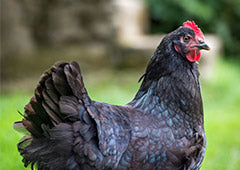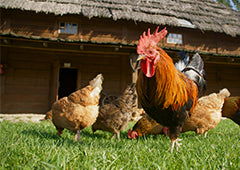Your girls have been supplying fresh produce daily for your family breakfast - until suddenly, egg production drops...or stops! How frustrating! Is your chicken sick? Are they being stubborn? You want your brekky back, pronto!
If you’ve noticed a decline or complete stoppage in egg production from your feathered flock, don’t immediately jump to the conclusion that your chickens are on death’s door, or threaten them with the chopping block for not delivering!
There are lots of reasons why your chicken’s normal laying cycle might be affected, and it ‘s usually easy to identify the cause - trace back your steps, and see if you can identify anything in the chicken’s life that may have changed recently. Feed, environment, new members to the flock...anything. Chickens are certainly creatures of habit, and upsets to their routine is definitely a precursor to nada eggs!
Here are some common reasons why your chicken may not be as productive as normal.
1. Nature Taking Its Course
There are many biological reasons that be the cause of reduced egg-production. Some can be cured or mended, i.e. if the chicken is suffering from an illness, some only stop the chicken from laying for a small period of time - others like old age are just natures way of telling your hen she’s done amazingly well laying plenty of eggs, now it’s time to for her to enjoy a peaceful, restful life pecking at grass and dust bathing.
-
Old age
If you’ve had henny penny in the family for a considerable amount of time, and you’ve noticed a slump in egg production, then maybe your hard working girl has reached the end of her laying days. There’s no exact age at which a chicken will stop laying, rather there will be a gradual decrease over time in the later years of their life.
-
Moulting
When hens moult, aka shed their feathers and sprout new ones, they won’t lay eggs - as all their energy is being devoted to regrowing a fresh coat! Their body needs a rest during this time, but they should start laying eggs again as soon as their body has recovered, and their coat is shiny and new.
-
Egg-Bound
Sometimes, our chickens are born with predisposed medical issues that can affect egg production. One such condition is egg-binding, where an egg can become stuck inside the hen. If you’re not sure whether your hen might be egg-bound, gently feel around her abdomen area - you might be able to feel an egg-shaped lump in your hens rear. You might even be able to see the lump protruding from their abdomen.
There are ways to give your hen a helping hand if you think they might be egg-bound - adding electrolytes and calcium to their diet, applying lubricant to her rear and ensuring your hen has a safe, comfortable place to lay her eggs in peace.
Find out more by reading our What To Do If Your Hen Is Egg-Bound article.
-
Broodiness
Collecting your eggs everyday is important, otherwise your hens might become broody. And when they’re broody, you won’t have any fresh eggs for breakfast! Leaving eggs in the nesting box can trigger the hen to become broody - meaning she’ll sit on the eggs and try to hatch them. Even if they aren’t fertile! When a hen becomes broody, she is unable to lay eggs - so collect them everyday, on the dot. If you let it slide and she’s allowed to go broody for a while, egg-production may not get back to normal for weeks.
2. Strung-Out Hens
Stress can be a big issue for hens - not only can it affect their health, but it can definitely cause a slump or stop them laying eggs! Here are some of the most common stresses, and quick ways to help coax egg production back to normal.
-
Change in coop environment
A change in a hens environment can cause egg production to slow or cease temporarily. Even something as simple as changing the bedding over can cause your chicken’s egg production to slow down - it should only be for a day or two though! Your chickens should return back to normal pretty quickly.
-
Predators/other pets
If you’ve got predators in your area and they’re lurking around the coop, their presence will probably be stressing your hens out - who wouldn’t be a bit irked by the sight of a rat, mouse or snake! This will likely cause your hens to decrease their egg-production. There are lots of easy ways to make your flock feel safe and keep laying behaviour normal:
- Give them a secure, predator-proof coop to live in
If your chickens are in a run, it can be a good idea to grow some plants inside it. This obscures the view of your chickens from any predators lurking outside - plus gives them some lovely shrubs to peck at!
You can read more in our ‘How To Help Your Hens Stress Less’ article on our Learning Centre, which has lots of information on common triggers and stress-free solutions.
3. Seasonal Changes
The environmental changes that winter brings can alter the biological reactions of your chickens - making them slow or stop their egg production. It is a completely natural occurrence, so don’t be alarmed. After the productive summer and autumn they’ve had, they deserve a break!
-
Winter
When winter rolls around, the environmental changes cause a biological reaction in the chicken, which slows or stops their egg production. Cold temperatures and decreased hours of sunlight affects the chicken’s laying behaviour, which is a perfectly natural reaction.
4. Environmental Problems
If your chickens aren’t comfortable in their environment, then this can lead to a lack of eggs for breakfast. Ensuring your chickens have access to all the facilities they need will keep the fresh eggs flowing.
-
Incorrect coop design
A coop that doesn’t have the necessary features to make a chicken comfortable is a recipe for an unproductive layer. For example, having to lay eggs without the privacy and comfort of a nesting box is an extremely unpleasant experience for a chicken.
5. Dietary Issues
If your chicken isn’t getting the right mix of nutrients in their diet, this will negatively affect your hens health and their ability to lay eggs.
Here are some common dietary problems that can cause a decrease in a hens egg production.
-
Swapping the feed for another type
Sudden changes in a chicken’s diet can stop them from producing eggs. For example, if you’ve been feeding your hens layer mash for the majority of their lives but then suddenly switch to pellet feed, your chickens will not appreciate it!
Introduce all new feed gradually, over the course of the week rather than an immediate swap.
-
Changing brands of feed
Different brands of chicken feed can have varying levels of vitamins and nutrients. This becomes a problem when a hen has gotten used to eating feed with a particular ingredient, only to be swapped to a brand that doesn’t include it in their recipe. Salt is one of the most common ingredients that varies from brand recipe to brand recipe - and a sudden deficiency from different feed can reduce a chicken’s egg production.
Keep an eye on nutrient levels if you’re thinking of switching feed brands, and if you do decide to change, do it gradually rather than immediately swapping.
So if your hen isn’t laying as productively as usual, there are lots of ways you can try to coax them back into normal laying behaviour - unless they’re taking a seasonal break during the colder months, or growing some shiny new feathers after moulting.
In order to get a frequent, fresh supply of eggs, keepers need to look after the chickens that lay them. There can be multiple issues that are stopping your ladies from laying which is stressful for them and for you! Don’t worry though – the eggsperts at Chickenpedia have cracked it once again! Their Eggs in Your Basket course will help you, help your ladies lay successfully. Discover crucial information to keep your chickens happy, healthy, and frequent layers. All your egg questions will be answered in this extensive course. From double yolkers, to soft shells, not eggs, to odd eggs, Chickenpedia cover it all!
They have also created a brilliant Chicken Healthcare Course. Did you know 67% of chicken keepers surveyed experienced a chicken health or behaviour issue in the first 12 months that they didn’t know how to handle? Their comprehensive online course includes everything you need, including what to look for in an unhealthy chicken and how to support your egg-laying hens to optimal health.
In fact, all of their courses are really well structured and filled with vital knowledge, which is why I highly recommend them to all of my readers! So, check out Chickenpedia today!
Having a chicken coop that has all the necessary facilities for them, such as ample nesting box space, ensures that they feel comfortable and safe - essential sentiments for any productive egg-layer! Thousands of Australian’s are enjoying their fresh eggs everyday by housing their chickens in the Taj Mahal, Penthouse and Mansion coop.

















